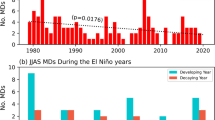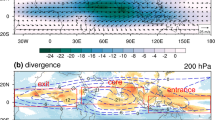Abstract
The different impacts of Pacific meridional mode (PMM) and central Pacific (CP) El Niño on tropical cyclone (TC) genesis over the western North Pacific (WNP) in the period of 1965–2018 were investigated in this study. The results show that PMM is mainly related to the eastern subtropical Pacific warming and CP El Niño is mainly related to the central tropical Pacific warming. They have a similar impact on TC genesis over the WNP and more TCs form in the east of the WNP due to the high correlation between the central tropical Pacific warming and eastern subtropical Pacific warming. In the central tropical Pacific, due to the SST forcing of the atmosphere, SST warming leads to the remarkable atmospheric response. In the eastern subtropical Pacific, the variation of the atmosphere precedes SST to establish the SST warming, and the atmospheric response to this SST warming is limited. During the CP El Niño, the anomalous convention associated with the central tropical Pacific warming produces a poleward extension of anomalous westerlies over the WNP by the Matsuno-Gill-type Rossby wave response. Such anomalous westerlies strengthen the monsoon trough (MT) with an eastward shift. The enhanced MT accompanied by the changed large-scale environmental conditions and synoptic-scale perturbations are beneficial to TC genesis over the WNP. However, the PMM with the eastern subtropical Pacific warming has no significant impact on the tropical circulation over the WNP and only a limited effect on the subtropical high. As a result, it has no direct effect on the MT, and the PMM itself has no significant positive correlation with TC genesis over the WNP. However, the impact of the PMM with the central tropical Pacific warming on TC genesis over the WNP is consistent with that during the CP El Niño. These findings suggest the dominant role of the SST warming in the central tropical Pacific on TC genesis over WNP, and the simultaneous impact of PMM on TC genesis over WNP is mainly realized by it.











Similar content being viewed by others
References
Ashok K, Behera SK, Rao SA, Weng H, Yamagata T (2007) El Niño Modoki and its possible teleconnection. J Geophys Res 112:C11007. https://doi.org/10.1029/2006JC003798
Camargo SJ, Sobel AH (2005) Western North Pacific tropical cyclone intensity and ENSO. J Climate 18:2996–3006. https://doi.org/10.1175/JCLI3457.1
Camargo SJ, Emanuel KA, Sobel AH (2007) Use of a genesis potential index to diagnose ENSO effects on tropical cyclone genesis. J Climate 20:4819–4834. https://doi.org/10.1175/JCLI4282.1
Chan JCL (1985) Tropical cyclone activity in the northwest Pacific in relation to the El Niño/Southern Oscillation phenomenon. Mon Weather Rev 113:599–606. https://doi.org/10.1175/1520-0493(1985)113,0599:TCAITN.2.0.CO;2
Chan JCL (2000) Tropical cyclone activity over the western North Pacific associated with El Niño and La Niña events. J Clim 13(16):2960–2972. https://doi.org/10.1175/1520-0442(2000)013<2960:TCAOTW>2.0.CO;2
Chan JCL, Liu KS (2004) Global warming and western North Pacific typhoon activity from an observational perspective. J Climate 17:4590–4602. https://doi.org/10.1175/3240.1
Chang P, Zhang L, Saravanan R, Vimont DJ, Chiang JCH, Ji L, Seidel H, Tippett MK (2007) Pacific meridinal mode and El Niño-Southern Oscillation. Geophys Res Lett 34:L16608. https://doi.org/10.1029/2007GL030302
Chen GH, Tam CY (2010) Different impacts of two kinds of Pacific Ocean warming on tropical cyclone frequency over the western North Pacific. Geophys Res Lett 37:L01803
Chia HH, Ropelewski CF (2002) The interannual variability in the genesis location of tropical cyclones in the northwest Pacific. J Climate 15:2934–2944
Chiang JCH, Vimont DJ (2004) Analogous Pacific and Atlantic meridional modes of tropical atmosphere–ocean variability. J Climate 17:4143–4158. https://doi.org/10.1175/JCLI4953.1
Feng T, Chen GH, Huang RH, Shen XY (2014) Large-scale circulation patterns favourable to tropical cyclogenesis over the western North Pacific and associated barotropic energy conversions. Int J Climatol 34(1):216–227. https://doi.org/10.1002/joc.3680
Frankignoul C, Czaja Z, L’Heveder B (1998) Air–sea feedback in the North Atlantic and surface boundary conditions for ocean models. J Climate 11:2310–2324
Fudeyasu H, Iizuka S, Matsuura T (2006) Impact of ENSO on landfall characteristics of tropical cyclones over the western North Pacific during the summer monsoon season. Geophys Res Lett. https://doi.org/10.1029/2006gl027449
Gao S, Zhu LF, Zhang W, Chen ZF (2018) Strong modulation of the Pacific meridional mode on the occurrence of intense tropical cyclones over the western North Pacific. J Climate 31:7739–7749. https://doi.org/10.1175/Jcli-D-17-0833.1
Gill AE (1980) Some simple solutions for heat-induced tropical circulation. Q J R Meteorol Soc 106:447–462. https://doi.org/10.1002/qj.49710644905
Gray WM (1979) Hurricanes: their formation, structure and likely role in the general circulation. In: Shaw DB (ed) Meteorology over the tropical oceans. Royal Meteorological Society, pp 155–218
Hong CC, Lee MY, Hsu HH, Tseng WL (2018) Distinct influences of the ENSO-like and PMM-like SST anomaly on the mean TC genesis location in the western North Pacific: the 2015 summer as an extreme example. J Climate 31:3049–3059. https://doi.org/10.1175/JCLI-D-17-0504.1
Huangfu JL, Chen W, Jian MQ, Huang RH (2019) Impact of the cross-tropopause wind shear on tropical cyclone genesis over the Western North Pacific in May. Climate Dyn 52:3845–3855. https://doi.org/10.1007/s00382-018-4363-4
Kalnay E, Kanamitsu M, Kistler R, Collins W, Deaven D, Gandin L, Iredell M, Saha S, White G, Woollen J, Zhu Y, Leetmaa A, Reynolds B, Chelliah M, Ebisuzaki W, Higgins W, Janowiak J, Mo KC, Ropelewski C, Wang J, Jenne R, Joseph D (1996) The NCEP/NCAR 40-year reanalysis project. Bull Am Meteorol Soc 77:437–471
Kao H, Yu J (2009) Contrasting eastern-Pacific and central-Pacific types of ENSO. J Climate 22:615–632
Kim HM, Webster PJ, Curry JAC (2011) Modulation of North Pacific tropical cyclone activity by three phases of ENSO. J Climate 24:1839–1849. https://doi.org/10.1175/2010JCLI3939.1
Knapp KR, Kruk MC, Levinson DH, Diamond HJ, Neumann CJ (2010) The international best track archive for climate stewardship (IBTrACS) unifying tropical cyclone data. Bull Am Meteorol Soc 91:363–376. https://doi.org/10.1175/2009BAMS2755.1
Lander MA (1994) An exploratory analysis of the relationship between tropical storm formation in the western North Pacific and ENSO. Mon Weather Rev 122:636–651
Lee T, McPhaden MJ (2010) Increasing intensity of El Nino in the central-equatorial Pacific. Geophys Res Lett 37:L14603. https://doi.org/10.1029/2010GL044007
Li CX, Wang CZ (2014) Simulated impacts of two types of ENSO events on tropical cyclone activity in the western North Pacific: large-scale atmospheric response. Climate Dyn 42:2727–2743. https://doi.org/10.1007/s00382-013-1999-y
Liebmann B, Smith CA (1996) Description of a complete (interpolated) OLR dataset. Bull Am Meteorol Soc 77:1275–1277
McBride JL (1995) Tropical cyclone formation. In: Global perspectives on tropical cyclones. World Meteorological Organization, pp 63–105
Qian Y, Murakami H, Nakano M, Hsu P-C, Delworth TL, Kapnick SB, Ramaswamy V, Mochizuki T, Morioka Y, Doi T, Kataoka T, Nasuno T, Yoshida K (2019) On the mechanisms of the active 2018 tropical cyclone season in the North Pacific. Geophys Res Lett 46:12293–12302
Rayner NA, Parker DE, Horton EB et al (2003) Global analyses of sea surface temperature, sea ice, and night marine air temperature since the late nineteenth century. J Geophys Res Atmos 108:4407. https://doi.org/10.1029/2002JD002670
Stuecker MF (2018) Revisiting the Pacific meridional mode. Sci Rep. https://doi.org/10.1038/s41598-018-21537-0
von Storch JS (2000) Signature of air–sea interactions in acoupled atmosphere–ocean GCM. J Climate 13:3361–3379
Wallace JM, Smith C, Jiang QR (1990) Spatial patterns of atmosphere-ocean interaction in the northern winter. J Clim 3(9):990–998. https://doi.org/10.1175/1520-0442(1990)003<0990:SPOAOI>2.0.CO;2
Wang B, Chan JCL (2002) How strong ENSO events affect tropical storm activity over the western North Pacific. J Climate 15:1643–1658. https://doi.org/10.1175/1520-0442(2002)015,1643:HSEEAT.2.0.CO;2
Weng HY, Ashok K, Behera SK, Rao SA, Yamagata T (2007) Impacts 290 of recent El Niño Modoki on dry/wet conditions in the Pacific rim during boreal summer. Climate Dyn 29:113–129
Wu RG, Kirtman BP, Pegion K (2006) Local air-sea relationship in observations and model simulations. J Climate 19:4914–4932. https://doi.org/10.1175/Jcli3904.1
Wu L, Wen ZP, Huang RH, Wu RG (2012) Possible linkage between the monsoon trough variability and the tropical cyclone activity over the western North Pacific. Mon Weather Rev 140:140–150. https://doi.org/10.1175/MWR-D-11-00078.1
Wu L, Chou C, Chen CT, Huang RH, Knutson TR, Sirutis JJ, Graner ST, Kerr C, Feng YC (2014) Simulations of the present and late-twenty-first-century western North Pacific tropical cyclone activity using a regional model. J Clim 27:3405–3424
Wu L, Wen ZP, Wu RG (2015a) Influence of the monsoon trough on westward-propagating tropical waves over the western North Pacific. Part I: observations. J Climate 28:7108–7127. https://doi.org/10.1175/JCLI-D-14-00806.1
Wu L, Wen ZP, Wu RG (2015b) Influence of the monsoon trough on westward-propagating tropical waves over the western North Pacific. Part II: energetics and numerical experiments. J Climate 28:9332–9349. https://doi.org/10.1175/JCLI-D-14-00807.1
Wu L, Zhang HJ, Chen MJ, Feng T (2018a) Impact of two types of El Niño on tropical cyclones over the western North Pacific: sensitivity to location and intensity of Pacific warming. J Climate 31:1725–1742. https://doi.org/10.1175/jcli-d-17-0298.1
Wu YK, Hong CC, Chen CT (2018b) Distinct effects of the two strong El Niño events in 2015–2016 and 1997–1998 on the western North Pacific monsoon and tropical cyclone activity: role of subtropical eastern North Pacific warm SSTA. J Geophys Res Oceans 123(5):3603–3618
Wu L, Wu RG, Zhang HJ, Feng T, Tang YL (2019) Tropical cyclones and multiscale climate variability: active western North Pacific typhoon season of 2018. Sci China Earth Sci. https://doi.org/10.1007/s11430-11019-19474-11434
Yanai M, Esbensen S, Chu JH (1973) Determination of bulk properties of tropical cloud clusters from large-scale heat and moisture budgets. J Atmos Sci 30:611–627. https://doi.org/10.1175/1520-0469(1973)030,0611:DOBPOT.2.0.CO;2
Yeh SW, Kug JS, Dewitte B, Kwon MH, Kirtman BP, Jin FF (2009) El Niño in a changing climate. Nature 461:511–514. https://doi.org/10.1038/nature08316
Yu JY, Kim ST (2010) Three evolution, patterns of central Pacific El Niño. Geophys Res Lett 37:L08706. https://doi.org/10.1029/2010GL042810
Yu L, Jin X, Weller RA (2008) Multidecade global flux datasets from the objectively analyzed air-sea fluxes (OAFlux) Project: latent and sensible heat fluxes, ocean evaporation, and related surface meteorological variables. Woods Hole Oceanographic Institution, OAFlux Project Technical Report. OA-2008-01
Yu JY, Lu MM, Kim ST (2012) A change in the relationship between tropical central Pacific SST variability and the extratropical atmosphere around 1990. Environ Res Lett 7:034025
Zhan R, Wang Y, Liu Q (2017) Salient differences in tropical cyclone activity over the western North Pacific between 1998 and 2016. J Climate 30:9979–9997. https://doi.org/10.1175/JCLI-D-17-0263.1
Zhang L, Chang P, Ji L (2009) Linking the Pacific meridional mode to ENSO: coupled model analysis. J Climate 22:3488–3505. https://doi.org/10.1175/2008jcli2473.1
Zhang W, Graf H-F, Leung Y, Herzog M (2012) Different El Niño types and tropical cyclone landfall in East Asia. J Climate 25:6510–6523. https://doi.org/10.1175/JCLI-D-11-00488.1
Zhang W, Vecchi GA, Murakami H, Villarini G, Jia L (2016a) The Pacific meridional mode and the occurrence of tropical cyclones in the western North Pacific. J Climate 29:381–398. https://doi.org/10.1175/JCLI-D-15-0282.1
Zhang W, Vecchi GA, Murakami H, Delworth T, Wittenberg AT, Rosati A, Underwood S, Anderson W, Harris L, Gudgel R, Lin SJ, Villarini G, Chen JH (2016b) Improved simulation of tropical cyclone responses to ENSO in the western North Pacific in the high-resolution GFDL HiFLOR coupled climate model. J Climate 29:1391–1415. https://doi.org/10.1175/Jcli-D-15-0475.1
Zhang HJ, Wu L, Huang RH, Chen JM (2018) Intensified impact of the central Pacific warming on the monsoon trough over the western North Pacific since 1984. Atmos Sci Lett 19:7. https://doi.org/10.1002/asl.828
Zuo H, Li T, Liu J, Peng M (2018) Physical processes controlling earlier and later onset of a typhoon season in the western North Pacific. Climate Dyn 51:2807–2823
Acknowledgements
This work is jointly supported by the National Natural Science Foundation of China Grant 41875117, and the Youth Innovation Promotion Association CAS 2017106. Dr. Jau-Ming Chen was supported by Minister of Science and Technology, Taiwan, under Grant MOST 108-2111-M-922-001-MY3.
Author information
Authors and Affiliations
Corresponding author
Additional information
Publisher's Note
Springer Nature remains neutral with regard to jurisdictional claims in published maps and institutional affiliations.
Rights and permissions
About this article
Cite this article
Zhang, H., Wu, L., Huang, R. et al. Does the Pacific meridional mode dominantly affect tropical cyclogenesis in the western North Pacific?. Clim Dyn 55, 3469–3483 (2020). https://doi.org/10.1007/s00382-020-05457-2
Received:
Accepted:
Published:
Issue Date:
DOI: https://doi.org/10.1007/s00382-020-05457-2




